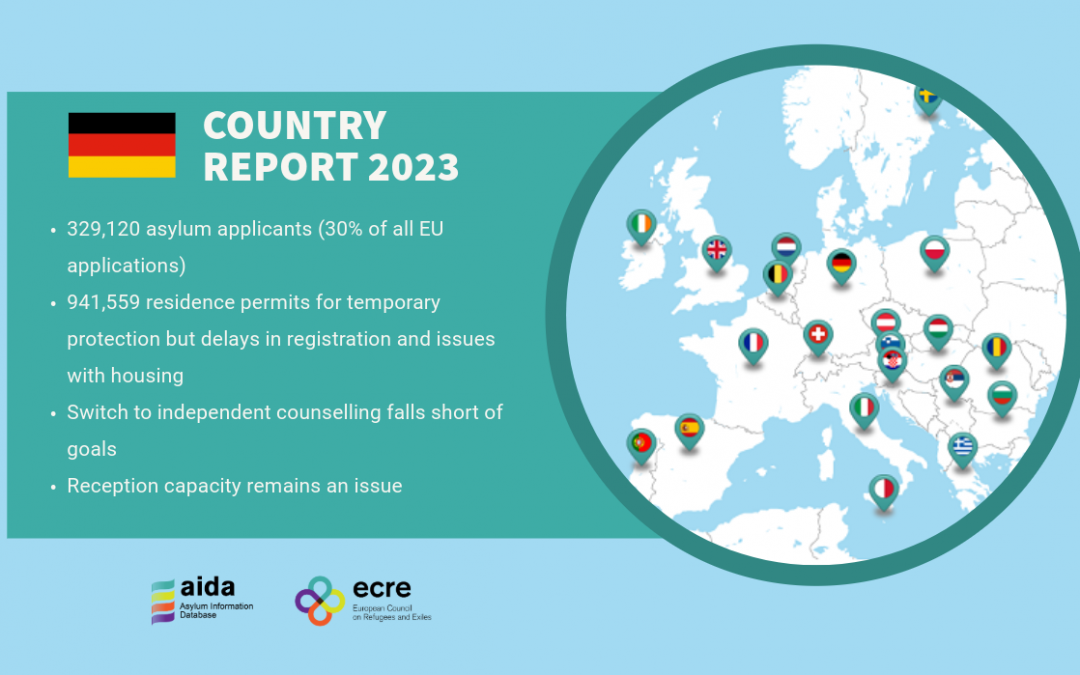The updated AIDA Country Report on Germany provides a detailed overview of legislative and practice-related developments in asylum procedures, reception conditions, detention of asylum seekers and content of international protection in 2023. It also includes an annex which provides an overview of temporary protection (TP).
In 2023, 329,120 applications for international protection were lodged in Germany. This represented a 72% increase from 2023 (190,816) and 30% of all applications in the EU. Applicants were mainly from Afghanistan, Syria, and Türkiye. The number of pending applications also increased substantially to 239,614 by the end of the year. The in-merit recognition rate at first instance was 68.6% (including national protection) but with wide variations depending on nationality (99.9% for Syrians, 98.7% for Afghans, 33.2% for Iraqis, 17.8% for Turks and 0.4% for Georgians).
As of February 2024, 1,139,689 people were registered in the Central Register of Foreigners under TP, and 941,559 people held a TP residence permit. In some regions, applicants had to wait several months for a decision and thus a residence permit. With the exception of North Rhine-Westphalia, the obligation to reside in the allocated municipality was maintained. Reception capacity issues continued across the country in 2023 and many TP beneficiaries faced housing issues. However, unlike asylum applicants, TP applicants and beneficiaries were able to access regular social benefits, although some faced practical hurdles due to administrative requirements.
The law on the acceleration of asylum court proceedings and asylum procedures entered into force on 1 January 2023. The reform notably provided for independent (as opposed to state-run) counselling for asylum applicants, a broader scope of revision by the Federal Administrative Court, and an overhaul of the grounds for cessation and revocation of residence permits. However, in March 2023, the Highest Administrative Court decided that local authorities were not required to provide NGOs and welfare associations with regular access to reception centres, except where independent counselling had been explicitly requested by an applicant. In general, the introduction of independent counselling fell short of its goals due to delays in implementation, practical obstacles for NGOs to access arrival centres, insufficient funding and a lack of reliable long-term funding strategies from the State.
Regarding access to the territory, additional border controls were introduced and extended at the borders with Poland, Czechia and Switzerland in 2023. While asylum applications at the border decreased significantly, the number of people arriving increased. The Federal Admissions Programme for Afghanistan, which had been launched in October 2022, was paused in March 2023 due to unfounded accusations of misuse. It was resumed in June 2023 with a new screening procedure.
Reception did not improve in 2023. In many states, capacity issues resulted in the use of emergency centres (e.g. exhibition grounds, tent facilities, etc.) with sub-standard living conditions. Regular reception centres, including arrival centres, were also overcrowded, resulting in a deterioration in living conditions. In addition, although the Higher Court of Baden-Wuerttemberg had ruled in 2022 that private rooms in mass accommodation centres were constitutionally protected, in June 2023, the Federal Administrative Court decided that searches by security personnel were allowed.
In 2024, states decided to introduce a payment card to replace cash benefits for asylum applicants. Although the cards function like debit cards and can be used to pay in supermarkets and other places, transfers from one card to another or to foreign countries is not possible and cash withdrawal is limited.
The time limit for asylum applicants living in reception centres to access the labour market has been shortened from nine to six months, and work permits for applicants living elsewhere, which are supposed to be delivered after three months, are no longer subject to a discretionary assessment by the authorities.
The detention of asylum applicants was both increased and reinforced through the Act on the Improvement of Removals, which was adopted on 18 January 2024.
Regarding the inclusion of beneficiaries of international protection, the Federal Government announced cuts in funding for 2024, including to measures such as migration counselling and psychological support centres for refugees and victims of torture. Some cuts were partially withdrawn following protests and advocacy efforts.
The full report is available here and the annex on temporary protection is available here.
For more information about the AIDA database or to read other AIDA reports, please visit the AIDA website.

